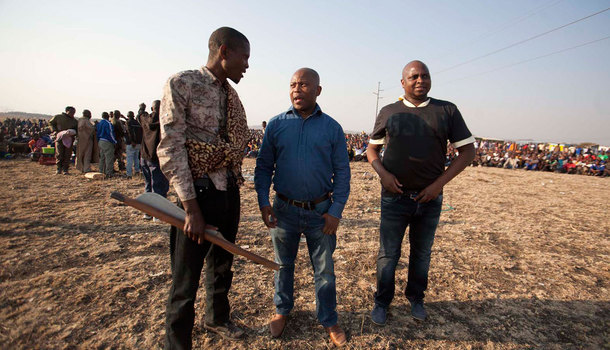It’s been one of the surprises of this project to see how often the subject of mining recurs. Miners have, of course, long been key figures in progressive and labor movements, but all that was supposed to be “old” capitalism. Today’s immaterial labor was not supposed to be affected by such issues. Only we’ve seen steel and coal strikes worldwide in the past year, from India to France, Spain and now South Africa. Given that the neoliberal solution to extracting primary resources has been to outsource them to developing nations, perhaps it is now caught in its own trap.
As you will know, striking miners at the Marikana mine owned by Lonmin in South Africa were fired on by police, leading to 44 deaths, 250 or more in hospital, and a further 259 under arrest. The issue here is that
rock drillers affiliated to the Association of Mineworkers and Construction Union (AMCU) demanded their monthly salary of R4 000 be increased to R12 500.
The rock drillers currently get paid a little over $300 a month for 12 hour days in which you are soaked by water from the drill heads. Other miners estimate that you can do this work for no longer than five years before your body gives out. By way of comparison, a US miner gets about $14.99 minimum for such work per hour, equivalent to $2500 a month, ranging up to $23 per hour, or about $3800 a month.
However, the South African National Union of Mineworkers, the official trade union, has not sanctioned the strike by the drillers. A new more radical union has arisen–the AMCU. The official union was at first even willing to endorse the company’s threat to the strikers that they must return to work by Tuesday morning or face dismissal. Now, following government intervention, dismissal has been taken off the table for the moment.
What happens next? Given the militancy displayed in recent days, it’s hard to see how people just go back to work. At a meeting yesterday Julius Malema, a former ANC activist now expelled from the party, called for the mine to be nationalized and for a change of national president. Mourners wearing “Fuck Capitalism” T-shirts clearly agreed. A man using a pseudonym for fear of retaliation told South Africa’s Mail and Guardian:
It’s better to die than to work for that shit. People are coming back here tomorrow [Monday]. I am not going to stop striking.
Further confrontation is surely inevitable.
Once again, London-based capital is behind all this. The anonymous sounding Lonmin company is in fact the notorious Lonhro company, standing for “London and Rhodesian Mining,” under a new name. Once run by the appalling Tiny Rowland, even a Conservative British prime minister designated the racist and exploitative company “the unpleasant and unacceptable face of capitalism.”
The new company has done very well out of the post-apartheid state, as its own website acknowledges:
Our operations, consisting of eleven shafts and inclines, are situated in the Bushveld Complex in South Africa, a country which hosts nearly 80% of global PGM resources. We have been granted a New Order Mining Licence by the South African government for our core operations, which runs to 2037 and is renewable to 2067. We have resources of 175 million troy ounces of PGMs and 43 million ounces of reserves.
Platinum sells for about $1400 an ounce, so it’s not surprising that Lonmin made $148 million profit in the second half of 2011. Six men died underground during this period, named
Thamage Kgwatlha, Modisaotsile Edward Setlhare, Alfiado Maziwe, Hermanus Potgieter, Rafael Macamo and Alpheus Mokgano Moerane.
Mining remains what it has always been: dirty, dangerous, exploitative, destructive to the environment and highly profitable. Ironically, one of the most significant uses of platinum is in catalytic converters for vehicles, designed to reduce pollution and carbon emissions.
When the video footage of the shootings came out, all the comparisons were to apartheid-era policing. Certainly, like police forces from New York to Athens, overreaction appears to be the policy of choice here. What is being defended, however, is not the local racialized privilege that ruled in Southern Africa for centuries but the neo-liberal formula of low local wages for high global profit. Of course, the workers still tend to be people of color and those profiting tend to call themselves “white.”
The question now is whether the miners’ action sets off a wider discontent with the post-apartheid settlement, as Julius Malema is arguing it should. Too little benefit has accrued to the majority population in the past decade. A new elite cadre class is doing very well at the behest of traditional interests.
There’s just the chance that neo-liberalism has undermined itself. The “Troubles” in Northern Ireland resulted from one day of violence, as did the militant stage of the anti-apartheid struggle. It’s too soon to tell if the Marikana mine massacre will be the new Bloody Sunday or Sharpeville. But if not here, soon. And not before time.

